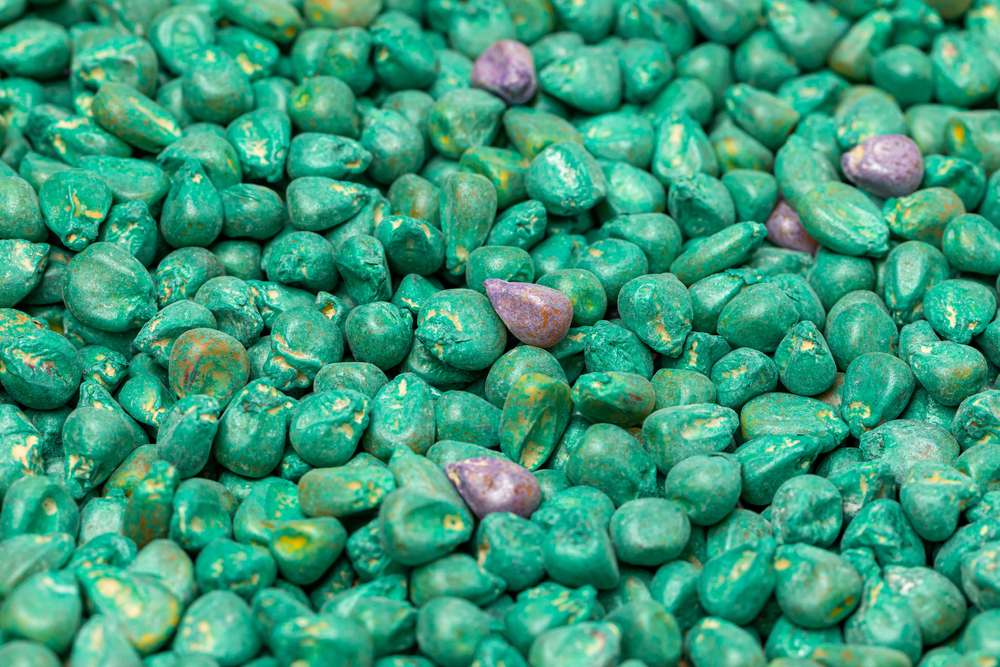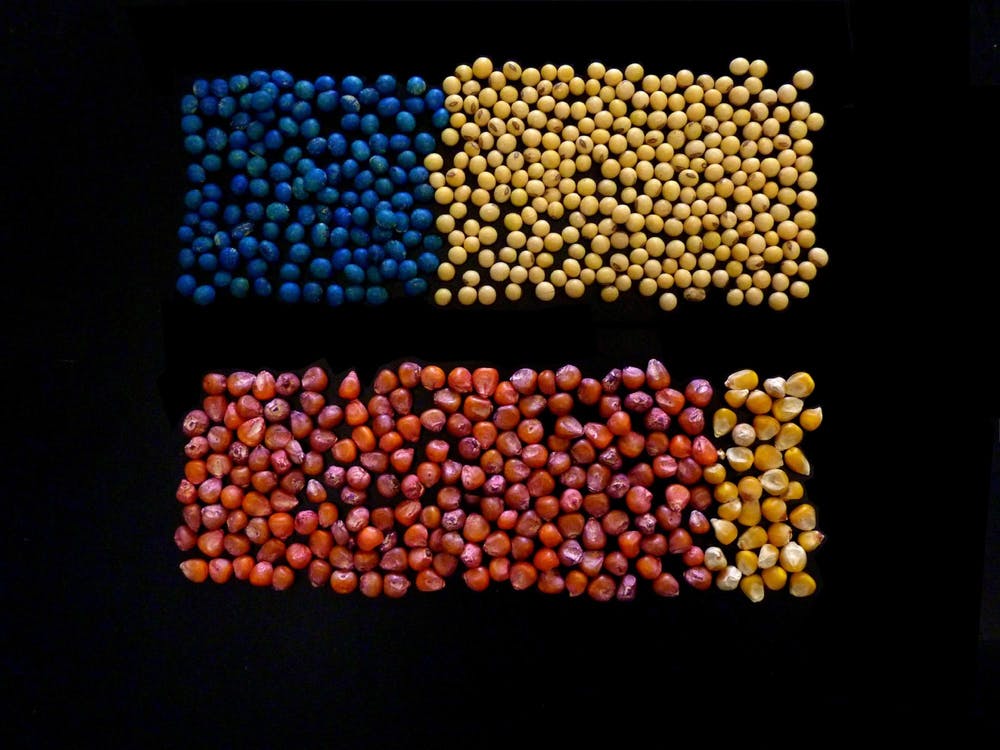Opinion: Farmers Are Overusing Insecticide-Coated Seeds
Studies suggest that seeds coated with neonicotinoid insecticides may harm nontarget insects, mammals and birds. In response, states are starting to restrict use of these products.
Opinion: Farmers Are Overusing Insecticide-Coated Seeds
Studies suggest that seeds coated with neonicotinoid insecticides may harm nontarget insects, mammals and birds. In response, states are starting to restrict use of these products.

Closeup of treated corn seed, which is very much not yellow anymore.by J.J. Gouin, Shutterstock.
This article is republished from The Conversation under a Creative Commons license. Read the original article.
Planting season for corn and soybeans across the US will begin as soon as March in Southern states and then move north. As farmers plant, they will deploy vast quantities of insecticides into the environment, without ever spraying a drop.
Almost every field corn seed planted this year in the United States will be coated with neonicotinoids, the most widely used class of insecticides in the world. So will seeds for about half of US soybeans and nearly all cotton, along with other crops. By my estimate, based on acres planted in 2021, neonicotinoids will be deployed across at least 150 million acres of cropland—an area about the size of Texas.
Neonicotinoids, among the most effective insecticides ever developed, are able to kill insects at concentrations that often are just a few parts per billion. That’s equivalent to a pinch of salt in 10 tons of potato chips. Compared with older classes of insecticides, they appear to be relatively less toxic to vertebrates, especially mammals.
But over the past decade, scientists and conservation advocates have cited a growing body of evidence indicating that neonicotinoids are harmful to bees. Researchers also say these insecticides may affect wildlife, including birds that eat the coated seeds.
In response to these concerns, Connecticut, Maryland, Vermont, Massachusetts, Maine and New Jersey have enacted laws limiting use of neonicotinoid insecticides. Other states are considering similar measures. Consumer and environmental advocates are also suing to force the US Environmental Protection Agency (EPA) to regulate coated seeds more tightly.
As an applied insect ecologist and extension specialist who works with farmers on pest control, I believe US farmers are using these insecticides far more heavily than necessary, with mounting harm to ecosystems. Moreover, our ongoing research indicates that using farming strategies that foster beneficial, predatory insects can greatly decrease reliance on insecticides.
Insecticides on seeds
Most neonicotinoids in the US are used as coatings on seeds for field crops like corn and soybeans. They protect against a relatively small suite of secondary insect pests—that is, not the main pests that typically damage crops. National companies or seed suppliers apply these coatings so that when farmers buy seeds they just have to plant them. As a result, surveys of farmers indicate that about 40 percent are unaware that insecticides are on their seeds.
The share of corn and soybean acreage planted with neonicotinoid-coated seeds has increased dramatically since 2004. From 2011 to 2014, the amount of neonicotinoids applied to corn doubled. Unfortunately, in 2015 the federal government stopped collecting data used to make these estimates.
Unlike most insecticides, neonicotinoids are water soluble. This means that when a seedling grows from a treated seed, its roots can absorb some of the insecticide that coated the seed. This can protect the seedling for a limited time from certain insects.
But only a small fraction of the insecticide applied to seeds actually enters seedlings. For example, corn seedlings take up only about two percent, and the insecticide persists in the plant for only two to three weeks. The critical question: Where does the rest go?

Pervading the environment
One answer is that leftover insecticide not taken up by plants can easily wash into nearby waterways. Neonicotinoids from seed coatings are now polluting streams and rivers across the US.
Studies show that neonicotinoids are poisoning and killing aquatic invertebrates that are vital food sources for fish, birds and other wildlife. Recent research has connected use of neonicotinoids with declines in the abundance and diversity of birds and the collapse of a commercial fishery in Japan.
Neonicotinoids also can strongly influence pest and predator populations in crop fields. In a 2015 study, colleagues and I found that use of coated soybean seeds reduced crop yields by poisoning insect predators that usually kill slugs, which cause serious damage in mid-Atlantic corn and soybeans fields. Subsequently, we found that neonicotinoids can decrease populations of insect predators in crop fields by 15 to 20 percent.
Recently we found that these insecticides can contaminate honeydew, a sugary fluid that aphids and other common sucking insects excrete when they feed on plant sap. Many beneficial insects, such as predators and parasitic wasps, feed on honeydew and may be poisoned or killed by neonicotinoids.
Are neonicotinoids essential?
Neonicotinoid advocates point to reports—often funded by industry—that argue that these products provide value to field crop agriculture and farmers. However, these sources typically assume that insecticides of some type are needed on every acre of corn and soybeans. Therefore, their value calculations rest on comparing neonicotinoid seed coatings with the cost of other available insecticides.
Recent field studies, however, demonstrate that neonicotinoid-coated seeds provide limited insect control because target pest populations tend to be scarce and treating fields for them yields little benefit.
Does this mean that the US should follow the European Union’s lead and ban neonicotinoids or adopt strict limits like those enacted in New Jersey?
As I see it, neonicotinoids can provide good value in controlling critical pest species, particularly in vegetable and fruit production, and managing invasive species like the spotted lanternfly. However, I believe the time has come to rein in their use as seed coatings in field crops like corn and soybeans, where they are providing little benefit and where the scale of their use is causing the most critical environmental problems.
Instead, I believe agricultural companies should promote, and farmers should use, integrated pest management, a strategy for sustainable insect control that is based on using insecticides only when they are economically justified. Recent research at Penn State and elsewhere reaffirms that integrated pest management can control pests in corn and other crops without reducing harvests.
Concerns about neonicotinoid-coated seeds are mounting as research reveals more routes of exposure to beneficial animals and effects on creatures they are not designed to kill. Agricultural companies have done little to address these issues and seem more committed than ever to selling coated seeds. Farmers often have very limited choice if they want to plant uncoated seeds.
Scientists are sounding the alarm about rising extinction rates worldwide, and research indicates that neonicotinoids are contributing to insect declines and creating more toxic agricultural lands. I believe it’s time to consider regulatory options to curb the ongoing abuse of neonicotinoid-coated seeds.
John F. Tooker is an associate professor of entomology and extension specialist at Pennsylvania State University.
Follow us
This work is licensed under a Creative Commons Attribution-NoDerivatives 4.0 International License.
Want to republish a Modern Farmer story?
We are happy for Modern Farmer stories to be shared, and encourage you to republish our articles for your audience. When doing so, we ask that you follow these guidelines:
Please credit us and our writers
For the author byline, please use “Author Name, Modern Farmer.” At the top of our stories, if on the web, please include this text and link: “This story was originally published by Modern Farmer.”
Please make sure to include a link back to either our home page or the article URL.
At the bottom of the story, please include the following text:
“Modern Farmer is a nonprofit initiative dedicated to raising awareness and catalyzing action at the intersection of food, agriculture, and society. Read more at <link>Modern Farmer</link>.”
Use our widget
We’d like to be able to track our stories, so we ask that if you republish our content, you do so using our widget (located on the left hand side of the article). The HTML code has a built-in tracker that tells us the data and domain where the story was published, as well as view counts.
Check the image requirements
It’s your responsibility to confirm you're licensed to republish images in our articles. Some images, such as those from commercial providers, don't allow their images to be republished without permission or payment. Copyright terms are generally listed in the image caption and attribution. You are welcome to omit our images or substitute with your own. Charts and interactive graphics follow the same rules.
Don’t change too much. Or, ask us first.
Articles must be republished in their entirety. It’s okay to change references to time (“today” to “yesterday”) or location (“Iowa City, IA” to “here”). But please keep everything else the same.
If you feel strongly that a more material edit needs to be made, get in touch with us at [email protected]. We’re happy to discuss it with the original author, but we must have prior approval for changes before publication.
Special cases
Extracts. You may run the first few lines or paragraphs of the article and then say: “Read the full article at Modern Farmer” with a link back to the original article.
Quotes. You may quote authors provided you include a link back to the article URL.
Translations. These require writer approval. To inquire about translation of a Modern Farmer article, contact us at [email protected]
Signed consent / copyright release forms. These are not required, provided you are following these guidelines.
Print. Articles can be republished in print under these same rules, with the exception that you do not need to include the links.
Tag us
When sharing the story on social media, please tag us using the following: - Twitter (@ModFarm) - Facebook (@ModernFarmerMedia) - Instagram (@modfarm)
Use our content respectfully
Modern Farmer is a nonprofit and as such we share our content for free and in good faith in order to reach new audiences. Respectfully,
No selling ads against our stories. It’s okay to put our stories on pages with ads.
Don’t republish our material wholesale, or automatically; you need to select stories to be republished individually.
You have no rights to sell, license, syndicate, or otherwise represent yourself as the authorized owner of our material to any third parties. This means that you cannot actively publish or submit our work for syndication to third party platforms or apps like Apple News or Google News. We understand that publishers cannot fully control when certain third parties automatically summarize or crawl content from publishers’ own sites.
Keep in touch
We want to hear from you if you love Modern Farmer content, have a collaboration idea, or anything else to share. As a nonprofit outlet, we work in service of our community and are always open to comments, feedback, and ideas. Contact us at [email protected].by John F. Tooker, Modern Farmer
March 15, 2022
Modern Farmer Weekly
Solutions Hub
Innovations, ideas and inspiration. Actionable solutions for a resilient food system.
ExploreExplore other topics
Share With Us
We want to hear from Modern Farmer readers who have thoughtful commentary, actionable solutions, or helpful ideas to share.
SubmitNecessary cookies are absolutely essential for the website to function properly. This category only includes cookies that ensures basic functionalities and security features of the website. These cookies do not store any personal information.
Any cookies that may not be particularly necessary for the website to function and are used specifically to collect user personal data via analytics, ads, other embedded contents are termed as non-necessary cookies.
more bunk from modern farmer. 40% unaware? Nonsense. we know what we are buying. often funded by industry??? That is an ad hom fallacy attack on studies. Studies that the gov’t requires the companies to fund.